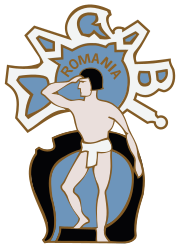Maccabi București
 | |||
| Full name | Maccabi București | ||
|---|---|---|---|
| Founded | 15 May 1919 | ||
| Dissolved | 1948 | ||
| Ground | Calea Dudeşti | ||
|
| |||
Maccabi or Macabi București, later known as Ciocanul, was a
History
Maccabi București was founded in 1919 by a Jewish entrepreneur at a time when representatives of the
Before the 1940–1941 season, at a time when Romania adopted antisemitic policies, the club was expelled from official competitions. It reemerged in 1945 at the end of World War II and kept its name before merging with another club to form Ciocanul.[3]
For the 1946 season, the club was coached by Hungarian coach Béla Guttmann, who went on to coach many prominent European and South American teams of the 1940s and 1950s.[4] Due to food shortages, Guttmann insisted his salary be paid in vegetables.[5][6] He subsequently walked out on the Romanian club after a director attempted to intervene in team selection.[7] German journalist Hardy Grune believed that he was frustrated with the corruption in the Romanian soccer world.[6]
As Ciocanul, the club played in two seasons in
Honours
- Winners (0):, Best finish: 7th 1946–47
- Winners (0):, Best finish: 7th
References
- ^ Popan, Cosmin (2006-09-06). "Onomastica hazlie a fotbalului". Cotidianul (in Romanian). Retrieved 2007-07-21.
- ^ "Cronologie. Geneză – pionierat – afirmare. Perioada interbelică: 1921 – 1945" (in Romanian). Romanian Handball Federation. Archived from the original on 2007-09-28. Retrieved 2007-07-22.
- ^ Ganur, Tomer (2006-08-10). הקשר הישראלי של דינמו בוקרשט. Ynet (in Hebrew). Yedioth Ahronoth. Retrieved 2007-06-09.
- OCLC 1024085926.)
{{cite book}}: CS1 maint: location missing publisher (link - ^ Contested Fields; A Global History of Modern Football
- ^ ISBN 978-1568587844.
- ^ "Bela Guttmann: The Coach, The Curse & The Lament of The Eagles". 24 September 2019.
- ^ a b Popeangă, Marius. "Stadioanele dispărute ale vechilor București". Adevărul (in Romanian). Archived from the original on 2012-07-22. Retrieved 2008-04-28.
